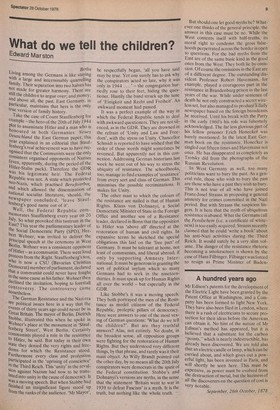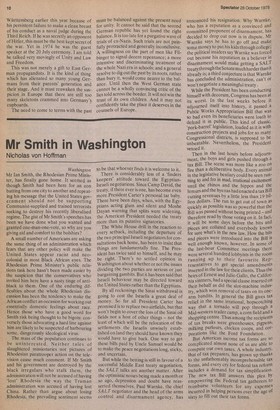What do we tell the children?
Edward' Mar ston
Berlin Living among the Germans is like staying With a large and interminably quarrelling family. Their separation into two halves has not made for greater harmony. There are still the children to argue over; and money; and above all, the past. East Germany, in Particular, maintains that hers is the only true version of family history. Take the case of Count Stauffenberg for example the hero of the 20th of July 1944 Plot to assassinate Hitler and a man who is honoured in both Germanies Nelms Deutschland the East German paper, this Year explained in an editorial that Stauffenberg's real achievement was to have recognised that the Communists were the only consistent organised opponents of Nazism (even, apparently, during the period of the Hitler-Stalin pack). Therefore the GDR was his legitimate heir. The Federal Republic was not. A state which protected neo-Nazis, which practised Berufrverbot, and which allowed the dissemination of national socialist literature, should, the newspaper concluded, 'leave Stauffenberg's good name out of it'. Well, the Federal Republic commemorates Stauffenberg every year on 20 July. So what provoked this tantrum in the East? This year the parliamentary leader of the Social Democratic Party (SPD), Herbert Wehner, was invited to deliver the Principal speech at the ceremony in West Berlin. Wainer was a consistent opponent of Hitler as a communist. There were loud Protests from the Right. Stauffenberg's son, Who is now a CSU (Bavarian Christian Democrat) member of parliament, declared that a communist could never have fought in the same cause as his father. Wehner then declined the invitation, hoping to forestall controversy. The controversy came nonetheless.
The German B.esistance and the Nazi era are political issues here in a way that the events of thirty years ago could never be in Great Britain. The mayor of Berlin, Dietrich Stobbe, illustrated this when he spoke in Wehner's place at the monument in `Stauffenberg Street', West Berlin. Certainly communists played a role in the resistance to Hitler, he said. But today in their own state they denied the very rights and freedoms for which the Resistance stood. Furthermore every class and profession Participated in the 'uprising of conscience' in the Third Reich. This 'unity' in the revul: Sion against Nazism had now to be translated into unity in the cause of democracy. It Was a moving speech. But when Stobbe had finished an insignificant figure stoodup from the ranks of the audience. `Mr Mayor', he respectfully began, 'all you have said may be true. Yet one surely has to ask why the conspirators acted so late, why it was only in 1944. the congregation hurriedly rose to their feet, hiding the questioner. Hastily the band struck up the tune of `Einigkeit und Recht und Freiheit'. An awkward moment had passed. It was a perfect example of the way in which the Federal Republic tends to deal with awkward questioners. They are not silenced, as in the GDR. They are drowned in the refrain of 'Unity and Law and Freedom', with the stress on Unity. Chancellor Schmidt is reported to have wished that the order of those words might sometimes be reversed. But apparently not in this connexion. Addressing German historians last week he went out of his way to stress the ubiquity of resistance. The schoolbooks, too, manage to find examples of 'resistance' from every sort and class of German. This minimises the possible recriminations. It makes for Unity. The other mast to which the colours of the resistance are nailed is that of Human Rights. Klaus von Dohnanyi, a Social Democratic Minister of State in the Foreign Office and another son of a Resistance leader, declared in Bonn that the opposition to Hitler was 'above all' directed at the restoration of human and civil rights. In expansive terms he sketched the special obligations this laid on the 'free part' of Germany. It must be tolerant at home, not least of communists, and liberal abroad, if only by supporting Amnesty International. It must be generous in granting the sort of political asylum which so many Germans had to seek in the nineteenthirties. It must speak up for Human Rights all over the world — but especially in the GDR.
Like Stobbe's it was a moving speech. They both portrayed the men of the Resistance as model citizens of the Federal Republic, proleptic pillars of democracy. Here were answers to one of the most vexing of German questions: 'What do we tell the children?'. But are they truthful answers? Alas, not entirely. No doubt, in the broadest sense, all opposition groups were fighting for the restoration of Human Rights. But they understood very different things, by that phrase, and rarely was it their main object. As Willy Brandt pointed out the other day, by no means all the 20th July conspirators were democrats in the spirit of the Federal constitution. Stobbe's and Dohnanyi's versions are myths, in the sense that the statement 'Britain went to war in 1939 to defeat Fascism' is a myth. It is the truth; but nothing like the whole_ truth. — But should one let good myths be? Whatever one thinks of the general principle, the answer in this case must be no. While the West contents itself with half-truths, its moral right to condemn the gross falsehoods perpetrated across the border is open to questions. For the bad myths from the East are of the same basic kind as the good ones from the West. They both lie by omission. Of course the omissions in the East are of a different degree. The outstanding dissident Professor Robert Havemann, for example, played a courageous part in the resistance in Brandenburg prison in the last years of the war. While under sentence of death he not only constructed a secret wireless set, but also managed to produce h daily newspaper based on the foreign broadcasts he received. Until his break with the Party in the early 1960's his role was fulsomely acknowledged. The far less glorious part of his fellow prisoner Erich Honecker was barely mentioned. In the latest East German book on the resistance, Honecker is singled out fifteen times and Havemann not once. He has disappeared as completely as Trotsky did from the photographs of the Russian Revolution.
In West Germany as well, too many politicians want to bury the past. As a general rule, those who wish to bury the past are those who have a past they wish to bury. This is not true of all who have joined Franz-Josef Strauss in proposing a general amnesty for crimes committed in the Nazi period. But with Strauss the suspicion lingers. It is here that the myth of ubiquitous resistance is abused. What the Germans call the Persilschein (i.e. a certificate of whiteness) is too easily acquired. Strauss recently claimed that he could 'write a book' about his anti-Nazi activities during the Third Reich. It would surely be a very slim volume. The danger of the resistance rhetoric becoming a smokescreen is shown by the case of Hans Filbinger. Filbinger was forced to resign as Prime Minister of Baden Wurttemberg earlier this year because of his persistent failure to make a clean breast of his conduct as a naval judge during the Third Reich. If he was secretly an opponent of Hitler, this must be the best kept secret of the war. Yet in 1974 he was the guest speaker at the 20 July ceremony. I am told he talked very movingly of Unity and Law and Freedom.
This was not merely a gift to East German propagandists. It is the kind of thing which has alienated so many young Germans from their parents' generation and their stage. And it must reawaken the suspicion in Europe that there are still too many skeletons crammed into Germany's cupboards.
The need to come to terms with the past must be balanced against the present need for unity. It cannot be said that the second German republic has yet found the right balance. It is too late for a purgative wave of trials of ex-Nazis. Such trials are not painfully protracted and generally inconclusive. A willingness on the part of men like Filbinger to signal decent repentance; a more intensive and discriminating treatment of the whole Nazi era in schools: and a general resolve to dig out the past by its roots, rather than bury it, would come nearer to the balance. Until then the West German state cannot be a wholly convincing critic of the lies told across the border. It will not win the trust of its own children. And it may not confidently take the place it deserves in the counsels of Europe.







































 Previous page
Previous page